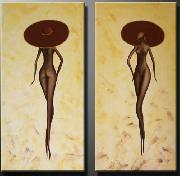|
|
Domenico Ghirlandaio
ID: 62410
Adoration of the Shepherds
new21/Domenico Ghirlandaio-455374.jpg
167 x 167 cm Santa Trinit? Florence "He painted in tempera, as a companion to this work, a Nativity of Christ which must excite the wonder of every thinking man, introducing his own portrait and some heads of shepherds, which are considered divine" (Vasari). The Sassetti Chapel is consecrated to the birth of Christ, and as a result much in the chapel is conceived with that event in mind. The altarpiece the Adoration of the Shepherds is the chapel 's key work not only in subject, but also in artistic merit. This composition was so successful that other artists frequently repeated it. Ghirlandaio himself appears in the scene, dressed as a shepherd. He is even allowed to come closer to the Christ Child than the donors, who appear in frescoes to the right and left, praying outside the confines of the panel. The artist, who is leading the shepherds, is kneeling and bringing the miracle of the birth of Christ to the attention of both the shepherds and the observers of the picture. His left hand, with which he is pointing to the Christ Child, is finely drawn and is superbly modelled in three dimensions. With his right hand, his painting hand, he is pointing to his chest, as he does in a later fresco in the Tornabuoni Chapel. As Ghirlandaio is pointing both at the child and the garlands on the Roman marble sarcophagus, it is possible that the gesture is saying: "This holy child was painted for you by me, the garland-maker Ghirlandaio." The classical sarcophagus in the picture is not just a manger for the ox and ass. It also has an iconographical significance indicated by the Latin inscription along its front: Ense cadens. Solymo. Pompei Pului[us] Augur Numen. Ait. Quae me conteg[it] Urna Dabit. [While Fulvi(us), augur of Pompey, was falling by the sword in Jerusalem he said: the urn that covers (conceals) me shall bring forth a god]. This is an ancient prophecy by Fulvius. The animals' manger will serve as a crib for the Christ Child. In his Adoration of the Shepherds, Ghirlandaio combines this reference to the Roman classical age with knowledge of Flemish art and turns them into an integrated whole. An historic event that took place a few years before this work was painted clearly left its mark behind on Ghirlandaio's work. An altarpiece ordered by Tommaso Portinari from Hugo van der Goes in Bruges reached Florence in May 1483. Florentine artists saw van der Goes' Adoration of the Shepherds as a shining comet showing new ways of painting. In Ghirlandaio's altarpiece, the shepherds pushing their way into the picture from the right, with their harsh, life-like features, are drawn directly from this Flemish model. Ghirlandaio's landscape in the background also displays features from north of the Alps
Buy Only Oil Painting

|

ORIGINALS
BACK
|
|

